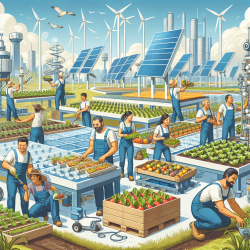Introduction
The quest for sustainable and equitable food systems has led to the rise of Alternative Food Systems (AFS). These systems aim to address the negative impacts of industrial agriculture, such as poor job quality and environmental degradation. However, the quality of jobs within AFS remains a concern. A recent study, "Between the Farm and the Fork: Job Quality in Sustainable Food Systems," provides valuable insights into labor demand and job quality in AFS. This blog explores how practitioners can leverage these findings to enhance their skills and contribute to the development of sustainable food systems.
Understanding Job Quality in AFS
The study highlights that while AFS roles, especially those close to consumers like food service and sales, show competitive wages, they often fail to meet living wage standards. This discrepancy poses a challenge to achieving equity within AFS. Practitioners should focus on understanding the nuances of job quality in AFS to create meaningful change.
Implementing Research Outcomes
Practitioners can take several steps to improve job quality in AFS based on the study's findings:
- Advocate for Policy Changes: Engage with policymakers to extend labor protections to farmworkers and ensure fair wages across all roles within AFS.
- Promote Institutional Support: Encourage institutions to integrate wage quality standards into their sourcing policies, thereby supporting businesses that prioritize fair labor practices.
- Enhance Worker Power: Support unionization efforts and workplace justice initiatives to empower workers and improve job conditions.
Encouraging Further Research
While the study provides a comprehensive overview of job quality in AFS, further research is essential to address existing gaps. Practitioners can contribute by:
- Conducting Local Assessments: Perform localized studies to understand specific labor market conditions and job quality in different regions.
- Exploring Non-Profit Roles: Investigate how non-profit and community-engaged work influences AFS development and labor conditions.
- Examining Equity Blind Spots: Analyze how current AFS practices may inadvertently replicate existing inequities and propose solutions to address these issues.
Conclusion
Improving job quality in AFS is crucial for achieving sustainable and equitable food systems. By implementing the research outcomes and encouraging further studies, practitioners can play a pivotal role in shaping the future of AFS. For those interested in delving deeper into the research, the original paper, "Between the Farm and the Fork: Job Quality in Sustainable Food Systems," offers a wealth of information and can be accessed here.










